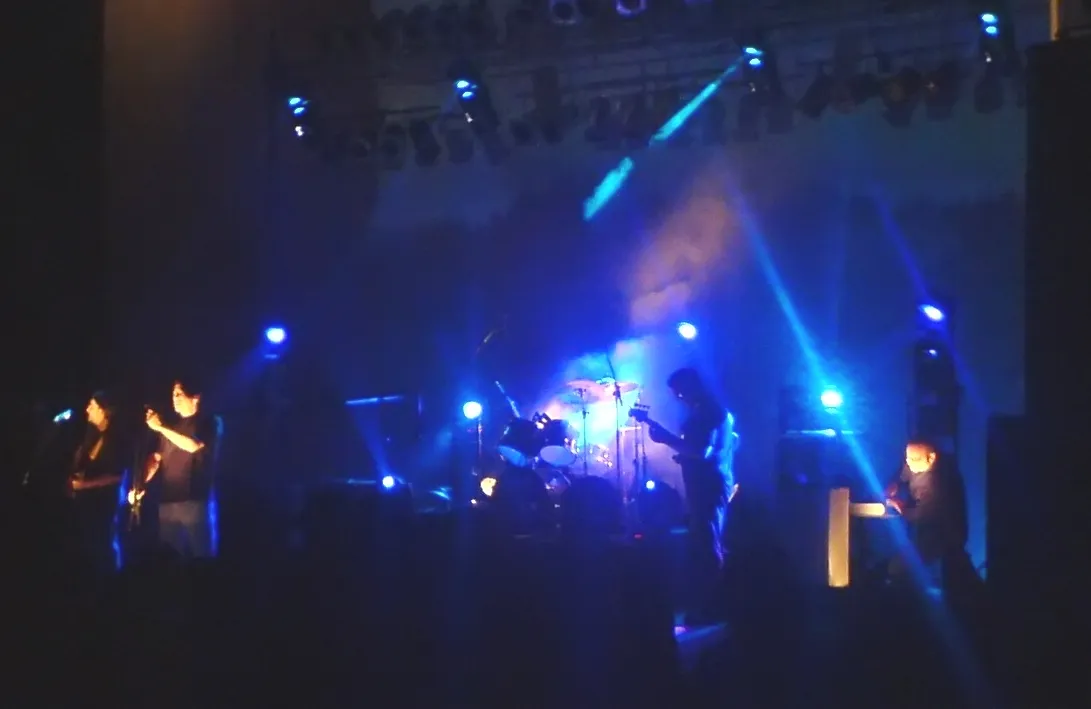“Block Out” and the dark fever dream of the Fall of Yugoslavia
U snove
Dodao sam boje
Sad se lepše vidi
I manje razume sveU oči
Pogledao tvoje
Tvoja borba jede
Samo tvoje vremeKad skupiš
Nekoliko reči grubih
Pa ih glasom
Raseješ ko semeKod tebe
Isti pogled ista priča
Svako čudo za tri dana sveneHajde uzmi me i prestani
Da vitlaš
Sa tim lasom
Oko meneOko mene
Brda i doline
Ja se vodom lečim
Žedan sam tišineZadrži svoj dah
Zažmuri u mrak
Nemoj snagu svoju bacati uz put
Zadrži svoj dah
Bez nade i straha
Nema pobedaA gore
Lete avioni lete duše
Lete oblaci i sećanjaI ljubav
Mi ko njene senke
Mi smo uvek iza ili ispred njeŠto blede
“Zadrži Svoj Dah” (2017), Nikola Vranjković
Veruju i slave
Podignuta čela i pognute glaveThere’s no better word to describe Block Out and their poetry than purity.
Purity of sound. Purity of thought. Purity of emotion.Growing up in what was then the Yugoslav capital of Belgrade, a Yugo ’90s kid, it was a very different world than growing up in the booming, happy, and rich West that once was. Our bleak, cold post-socialist landscape was a hodgepodge of everyday violence, survival struggles, and a collective depression pressing down on the entire population — a unique mass psychosis, the aftermath of that famous curse: “May you have everything, and then lose it all.”
We had it all. And then, we lost it all.
No one captured the true state of our unraveling minds and the crumbling empire around us better than Block Out. Not a politician. Not a writer. A band — obscure, unintrusive, carefully hiding from the limelight. They became the voice of a generation watching everything fall apart, each lyric wrapped in the cold reality of collapse.
Too bad you can’t fully grasp the nuances of Serbo-Croatian. The lyrics, their sound — those words would blow your mind. Some say there’s never been a language so adept at capturing the human soul through the sound of the words alone. Even Goethe1 was mesmerized, learning the language alongside Jacob Grimm, just so they could read Serbian folk epic poetry in its native form.
This language, now fractured into what they call Serbian, Croatian, Bosnian, and Montenegrin, is not many languages, but one — just broken into pieces by the tempest of history. Yet, even divided, it remains powerful, shaping the deepest thoughts with uncanny ease. The legacy of prose and poetry it left behind is stunning for such a small group of people.
With the splitting of this shared language, Yugoslavia became the Tower of Babel. And Block Out? They witnessed it all, not as leaders, but with a vision sharper than any of them. And left the testimony for all of us to research for centuries to come.
I bumped into them a few times, in the dark corners of Akademija, the legendary Belgrade club of the ’90s. They stood huddled in corners, bleak and morose. I was in different musical waters, but their sound appealed to my most primal instincts. It rang out on the same vibration as my soul.
Block Out gang were the darkest, most morose and introverted people you could imagine. The kind of folks that can sit for hours together in thinking silence. And their music — so dark, many friends of mine couldn’t even bring themselves to listen. If you didn’t have the heart to endure it, it could drag you down into places I don’t care to revisit. It was both a call-out and a damnation of the life we were living, the reality unfolding around us, wrapped in deep, raw, visceral tones.
In Block Out’s dystopian vision of the shattered Yugoslav dream, once monsters took over, we all became monsters. Those on stage, and those in the darkness watching them. When basic survival instincts took hold and they became monsters too, the band fell apart, much like Yugoslavia. Nikola Vranjković, the band’s creative powerhouse (and writer of the song in quotes) and one of the greatest guitarists in modern Serbian rock, parted ways, just like the country did — an art-imitating-life moment. The wear and tear was always there. It was bound to go that way.
Vranjković went on to release a powerful solo album and built a strong concert presence, releasing masterpieces that in every way continue to breathe the Block Out energy. But for us, the true Block Out devotees, every song still feels like it would be better with that same voice that graced all their songs: Milutin “Mita” Jovančić, the dark man himself.
And I chose this one, specifically, because the probably last recording of the band has Mita singing this particular song, never to be released on a Block Out album, but instead finding itself on Nikola’s solo-project. What better death there is, then life after death.
Link to Mita singing “Zadrži Svoj Dah”
Link to Nikola Vranjković album version music videoMita’s voice was the very embodiment of the collective darkness and despair prevailing in the souls of all of us in the cursed Yugoslav cultural space. A deep, baritone angel of doom, whispering to the broken and the lost. The words sang by him are like a constant soundtrack to those left standing, while so many were gone or had gone mad:
“Hold your breath, and close your eyes in this darkness.
Hold your breath, without hope and fear there’s no victory.”Quotes:
1 Link to the Wikipedia Article quote: https://en.wikipedia.org/wiki/Serbian_language#:~:text=Goethe%20and%20Jacob%20Grimm%20learned,estranged%20from%20the%20spoken%20language.
Poetry Of The Fall
